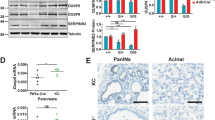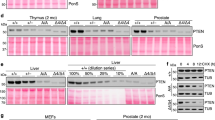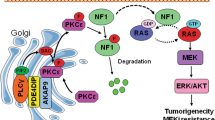Abstract
Phosphoinositide-3-OH kinases (PI(3)Ks) constitute a family of evolutionarily conserved lipid kinases that regulate a vast array of fundamental cellular responses, including proliferation, transformation, differentiation and protection from apoptosis1,2. PI(3)K-mediated activation of the cell survival kinase PKB/Akt, and negative regulation of PI(3)K signalling by the tumour suppressor PTEN (refs 3, 4) are key regulatory events in tumorigenesis5,6,7. Thus, a model has arisen that PI(3)Ks promote development of cancers. Here we report that genetic inactivation of the p110γ catalytic subunit of PI(3)Kγ (ref. 8) leads to development of invasive colorectal adenocarcinomas in mice. In humans, p110γ protein expression is lost in primary colorectal adenocarcinomas from patients and in colon cancer cell lines. Overexpression of wild-type or kinase-dead p110γ in human colon cancer cells with mutations of the tumour suppressors APC and p53 , or the oncogenes β-catenin and Ki-ras, suppressed tumorigenesis. Thus, loss of p110γ in mice leads to spontaneous, malignant epithelial tumours in the colorectum and p110γ can block the growth of human colon cancer cells.
This is a preview of subscription content, access via your institution
Access options
Subscribe to this journal
Receive 51 print issues and online access
$199.00 per year
only $3.90 per issue
Buy this article
- Purchase on Springer Link
- Instant access to full article PDF
Prices may be subject to local taxes which are calculated during checkout





Similar content being viewed by others
References
Toker, A. & Cantley, L. C. Signalling through the lipid products of phosphoinositide-3-OH kinase. Nature 387 , 673–676 (1997).
Leevers, S. J., Vanhaesebroeck, B. & Waterfield, M. D. Signalling through phosphoinositide 3-kinases: the lipids take centre stage. Curr. Opin. Cell Biol. 11 , 219–225 (1999).
Cantley, L. C. & Neel, B. G. New insights into tumor suppression: PTEN suppresses tumor formation by restraining the phosphoinositide 3-kinase/AKT pathway. Proc. Natl Acad. Sci. USA 96, 4240 –4245 (1999).
Maehama, T. & Dixon, J. E. PTEN: a tumour suppressor that functions as a phospholipid phosphatase. Trends Cell Biol. 9, 125–128 (1999).
Franke, T. F., Kaplan, D. R. & Cantley, L. C. PI3K: downstream AKTion blocks apoptosis. Cell 88, 435–437 ( 1997).
Shayesteh, L. et al. PIK3CA is implicated as an oncogene in ovarian cancer. Nature Genet. 21, 99-102 (1999 ).
Di Cristofano, A., Pesce, B., Cordon-Cardo, C. & Pandolfi, P. P. Pten is essential for embryonic development and tumour suppression. Nature Genet. 19, 348–355 (1998).
Sasaki, T. et al. Function of PI3Kγ in thymocyte development, T cell activation, and neutrophil migration. Science 287, 1040 –1046 (2000).
Stoyanov, B. et al. Cloning and characterization of a G protein-activated human phosphoinositide-3 kinase. Science 269, 690–693 (1995).
Stephens, L. R. et al. The G βγ sensitivity of a PI3K is dependent upon a tightly associated adaptor, p101. Cell 89, 105–114 (1997).
Li, Z. et al. Roles of PLC-β2 and-β3 and PI3Kγ in chemoattractant-mediated signal transduction. Science 287, 1046—1049 (2000).
Hirsch, E. et al. Central role for G protein-coupled phosphoinositide 3-kinase γ in inflammation. Science 287, 1049– 1053 (2000).
Kinzler, K. W. & Vogelstein, B. Lessons from hereditary colorectal cancer. Cell 87, 159 –170 (1996).
MacPhee, M. et al. The secretory phospholipase A2 gene is a candidate for the Mom1 locus, a major modifier of ApcMin-induced intestinal neoplasia. Cell 81, 957–966 ( 1995).
Bernstein, H. G., Keilhoff, G., Reiser, M., Freese, S. & Wetzker, R. Tissue distribution and subcellular localization of a G-protein activated phosphoinositide 3-kinase. An immunohistochemical study. Cell Mol. Biol. 44, 973– 983 (1998).
White, R. L. Tumor suppressing pathways. Cell 92, 591 –592 (1998).
Zhou, S., Kinzler, K. W. & Vogelstein, B. Going mad with Smads. N. Engl. J. Med. 341, 1144–1146 (1999).
Korinek, V. et al. Constitutive transcriptional activation by a β-catenin-Tcf complex in APC-/- colon carcinoma. Science 275, 1784-1787 (1997).
He, T. C. et al. Identification of c-MYC as a target of the APC pathway. Science 281, 1509–1512 ( 1998).
Tetsu, O. & McCormick, F. β-catenin regulates expression of cyclin D1 in colon carcinoma cells. Nature 398, 422–426 (1999).
Groden, J. et al. Response of colon cancer cell lines to the introduction of APC, a colon-specific tumor suppressor gene. Cancer Res. 55, 1531–1539 (1995).
Boutron, M. C., Wilpart, M. & Faivre, J. Diet and colorectal cancer. Eur. J. Cancer Prev. 1, 13–20 ( 1991).
Rudolph, U. et al. Ulcerative colitis and adenocarcinoma of the colon in Gαi2-deficient mice. Nature Genet. 10, 143– 150 (1995).
Fata, J. E., Leco, K. J., Moorehead, R. A., Martin, D. C. & Khokha, R. Timp-1 is important for epithelial proliferation and branching morphogenesis during mouse mammary development. Dev. Biol. 211, 238–254 (1999).
Acknowledgements
We thank M. Saunders for scientific editing and J. Ho, K. Jazier, M. Crackower, A. Oliveira-dos-Santos, L. Zhang, N. Joza, C. Krawczyk, I. Kozieradzki, M. Cheng, R. Sarao, Y.-Y. Kong, M. Nghiem, Q. Liu, E. Griffith, R. Williams, C. Sirard, V. Stambulic, M. Reth, C. Potten, A. Nepren, H. Okada, Y. Jang, S. Pownall, D. Lacey and W. Boyle for reagents and helpful discussions. This work is supported by grants from Amgen, the National Cancer Institute of Canada and the Canadian Center of Excellence for Tumor Vaccination.
Author information
Authors and Affiliations
Corresponding author
Supplementary information
Supplementary Information
Supplementary Information (PDF 42 kb)
Rights and permissions
About this article
Cite this article
Sasaki, T., Irie-Sasaki, J., Horie, Y. et al. Colorectal carcinomas in mice lacking the catalytic subunit of PI(3)Kγ . Nature 406, 897–902 (2000). https://doi.org/10.1038/35022585
Received:
Accepted:
Issue Date:
DOI: https://doi.org/10.1038/35022585
This article is cited by
-
Targeting PI3K/Akt signal transduction for cancer therapy
Signal Transduction and Targeted Therapy (2021)
-
FOXO3 expression during colorectal cancer progression: biomarker potential reflects a tumour suppressor role
British Journal of Cancer (2013)
-
Synergism between altered cortical polarity and the PI3K/TOR pathway in the suppression of tumour growth
EMBO reports (2012)
-
Studies on the Expression Patterns of Class I PI3K Catalytic Subunits and Its Prognostic Significance in Colorectal Cancer
Cell Biochemistry and Biophysics (2012)
-
Targeting PI3K in neuroblastoma
Journal of Cancer Research and Clinical Oncology (2010)
Comments
By submitting a comment you agree to abide by our Terms and Community Guidelines. If you find something abusive or that does not comply with our terms or guidelines please flag it as inappropriate.



